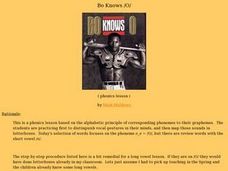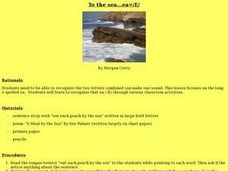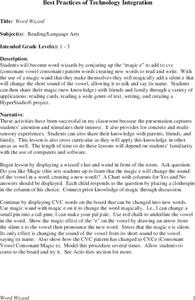Curated OER
How Many Feet Will We Meet?
Emerging speakers distinguish between the sounds for short vowel /e/ and long vowel /e/. They are introduced to the vowel patterns that comprise the long vowel sounds, with emphasis on /ee/. They practice reading and spelling a variety...
Curated OER
Bee a Reader
Use a fun tongue twister to help your class remember the /ee/ sound! With this lesson, they distinguish between the sounds for short vowel e and long vowel e. They are introduced to the vowel patterns that comprise long vowel sounds,...
Curated OER
I Scream You Scream We All Scream for Ice Cream!
Use letter boxes and example words to help kids distinguish between the sounds for short vowel e and long vowel e. They are introduced to the vowel patterns that comprise long vowel sounds, with a particular emphasis on /ea/. They...
Curated OER
Peachy Teacup by the Stream
Help your kids distinguish between the sounds for short vowel /e/ and long vowel /e/. They are introduced to the vowel patterns that comprise long vowel sounds, with a particular emphasis on /ea/. They practice reading and spelling a...
Curated OER
Combining Syllables to Form 2- and 3-Syllable Words
Students practice combining consonant-vowel-consonant sounds to form words. They read closed and silent "e" syllables. Students construct two-syllable words. They arrange syllables to form three and four syllable words.
Curated OER
Hi, My Name is A
Learners distinguish between short vowel a and long vowel a. They are introduced to the vowel-consonant-e pattern that changes short vowel sounds into long vowel sounds. They practice decoding pseudo words with the vowel-consonant-e...
Curated OER
EA Words
Students determine if the "e" sound is long or short in words. In this language arts lesson, students practice discriminating between the long and short "e" sounds by practicing with word cards that are embedded in the lesson. This...
Curated OER
Excellent Elephant
In this letter e worksheet, students color the letter e's and enhance their understanding of spatial terms by listening to the teacher's instructions. Students then circle the pictures at the bottom of the page that have the 'e' or 'eh'...
Curated OER
Oh My
Students are introduced to the vowel-consonant-e patter that changes short vowel sounds into long vowel sounds. They distinguish between the short vowel sound for o and the long vowel sound for o. Students practice reading and spelling...
Curated OER
Wade Swayed At the Masquerade
Students practice reading words with vowel patterns that change the sound of the vowel. After reviewing the short vowel sound /a/, they are introduced to the vowel-consonant-e pattern that changes the short vowel sound into a long vowel...
Curated OER
Bo Knows "O"
Learners are introduced to the vowel-consonant-e patter that changes short vowel sounds into long vowel sounds. They distinguish between the short vowel o and long vowel o. Students practice reading and spelling words with the...
Curated OER
Oh! Let's Go Home
Young scholars distinguish between short vowel o and long vowel o. They are introduced to the vowel-consonant-e pattern that changes short vowel sounds into long vowel sounds. They practice reading and spelling words with the...
Curated OER
Beginning Reading Design: Blending Boats
Students study how to blend the sounds together in words with the CVC form. They use letter cards and the books, "Tin Man Fix-It," and Dr. Seuss', Green Eggs and Ham. They work with /m/ words to blend the sounds together to read words....
Curated OER
To the Sea
Improve pronunciation and phonemic awareness in your first and second graders! With this plan, they distinguish between the sounds for short vowel e and long vowel e. They are introduced to the vowel patterns that comprise long vowel...
Curated OER
Shake With A
Use letter boxes and letter tiles (d,a,y,l,p,w,k,f,r,i,t,s,b,c,I) to help your class distinguish between the sounds for short vowel a and long vowel a. They are introduced to the vowel patterns that comprise long vowel sounds, with a...
Houghton Mifflin Harcourt
A World of Animals: English Language Development Lessons (Theme 10)
Animals are the theme of this series of English language development lessons. Scholars take part in grand conversations about woodland, jungle, and grassland animals. They also go on picture walks, read poems and high...
Lerner Publishing
Teaching Vowel Combinations
Need some fun activities to augment your lessons on vowel patterns and phonemic awareness? Peruse a series of worksheets designed to help little ones with their early reading skills.
Curated OER
Eerie Exits
Young scholars recognize the short vowel e in written and spoken language. Through matching and listening activities, they discriminate the short vowel /e/ from other phonemes. Students associate the phoneme with its letter...
Curated OER
Phoneme Segmentation
Students practice counting the number of sounds in names and words through the use of a ninja puppet that chops the sounds. The emphasis is on the breaking up of the names with the use of karate chops to increase student participation.
Curated OER
Shhhhhhh! The sheep are sleeping!
Students examine the use of /sh/ in written and spoken words by watching how their mouth moves while making the sound, identifying words, listening to a story, and making words with Elkonin letterboxes. As an assessment, they complete a...
Curated OER
"Ea" Review
In this vowel combinations worksheet, students respond to 40 fill in the blank and short answer questions that require them to identify and use words have the "ea" sound.
Curated OER
Word Wizard
Students make magic wands to become word wizards who add the magic "e" to word with cvc patterns. They make reading cards, and a multimedia presentation show the use of the word patterns.
Curated OER
The Race To Space
Learners distinguish between short vowel a and long vowel a. They are introduced to the vowel-consonant-e pattern that changes short vowel sounds into long vowel sounds. They practice reading words with the vowel-consonant-e pattern.
Curated OER
Language: lesson 23
In this language arts worksheet, students complete activities such as reading, writing high frequency words, finding long o words, fill in the blanks, and short answers. Students complete 4 activities.























